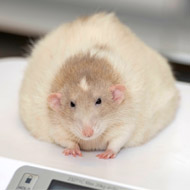Podgy pets set to battle the bulge

Monster rat Mr. T has scoffed his way to double his ideal size.
A mighty moggy too big for his cat flap and a porky pooch who once stole an entire Sunday roast are set to go head-to-head in the UK’s ultimate pet weight-loss challenge.
The 2018 PDSA Pet Fit Club will see seven dogs, five cats and one rat compete to win a year’s supply of pet food and a pet-friendly holiday. With a combined weight of 31st 7lb, these podgy pets currently weigh more than the world’s strongest man.
This year’s line-up includes Bella the beagle, who has munched her way to a staggering 9kg (1.6lb) and a cheese-loving chihuahua pug cross, who snacked her way to become a colossal 10.65kg.
One of the more usual candidates in this years’ competition is a ‘monster rat’ named Mr T. Mr T has also scoffed his way to double the size he should be, and now needs to lose around 0.475kg (1st 8lb) to be fit and healthy again.
Since Pet Fit Club was established in 2005, some 124 overweight and obese pets have been helped to lose an incredible 450kg (71 stone). To help them lose weight, the participants are put on a strict six-month diet and exercise programme, overseen by PDSA vets and veterinary nurses.
PDSA vet, Olivia Anderson-Nathan, said: “Pet obesity is an epidemic that is seriously impacting the lives of millions of pets across the country. As with humans, carrying excess weight has serious health implications for our four-legged friends. It increases the chances of life-limiting and life-threatening conditions such as arthritis, diabetes and heart diseases.”
“With the help of PDSA and Pet Fit Club, these pets and their owners are making the necessary diet, exercise and lifestyle changes to get down to healthier weights. We will support them every step of the way over the next six months to ensure they succeed."



 The latest
The latest